IVP Pocket Reference Series (13 vols.)
Digital Logos Edition
Overview
The IVP Pocket Reference Series was designed for students, pastors, and other busy people who want an aid to formal or informal study. Informative, clear, brief, and affordable, the books included in this series will become your constant companion as you tackle the study of biblical languages, church history, apologetics, contemporary religions, ethics, theology, and more.
- Designed for students, pastors, and other busy people
- Prepares Christians to talk with others about religious matters
- Covers biblical languages, church history, apologetics, contemporary religions, ethics, theology, and more
- Title: IVP Pocket Reference Series
- Series: IVP Pocket Reference
- Publisher: IVP Academic
- Volumes: 13
- Pages: 1,845
- Resource Type: Topical
- Topic: Ministry Resources
Individual Titles
- Pocket Dictionary for the Study of Biblical Hebrew by Todd J. Murphy
- Pocket Dictionary of Church History by Nathan P. Feldmeth
- Pocket Dictionary of Ethics by Stanley J. Grenz and Jay T. Smith
- Pocket Dictionary of Liturgy and Worship by Brett Scott Provance
- Pocket Dictionary of the Reformed Tradition by Kelly M. Kapic and Wesley Vander Lugt
- Pocket Guide to World Religions by Winfried Corduan
- Pocket Handbook of Christian Apologetics by Peter Kreeft and Ronald K. Tacelli
- Pocket History of the Church by D. Jeffrey Bingham
- Pocket History of Theology by Roger E. Olson and Adam C. English
- Pocket Dictionary for the Study of New Testament Greek by Matthew S. DeMoss
- Pocket Dictionary of Apologetics and Philosophy of Religion by C. Stephen Evans
- Pocket Dictionary of Biblical Studies by Arthur G. Patzia and Anthony J. Petrotta
- Pocket Dictionary of Theological Terms by Stanley J. Grenz, David Guretzki, and Cherith Fee Nordling
This title is included in the following collections
You can save when you purchase this product as part of a collection.
IVP Pocket Reference Series (1...
$119.85$99.992025 포트폴리오 서재
$2,999.99$2,249.992025 이중언어 포트폴리오 서재
$6,399.99$4,799.992025 Ultimate Library
$23,999.99$17,999.99
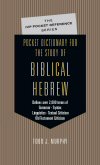
Of Greek and Hebrew, Hebrew strikes the most fear in the heart of the Bible student. The alphabet does not look anything like English. The vocabulary offers almost no points of contact with English. The verb system is utterly alien. And the lexicons, grammars, and textbooks are wrapped up in a metalanguage—spiked with Latin—that is daunting in itself. For those who feel that studying the English Old Testament is a challenge, the thought of reading it in Hebrew is extreme. Hebrew students need all the help they can get.
If you are beginning your study of Hebrew and the Hebrew Bible, this pocket dictionary by Todd J. Murphy is for you. From ablative to zaqeph qaton, it defines the tangled terms that infest Hebrew textbooks, grammars, and lexicons. Here is a book that will deliver you from the perils of the Piel and the thicket of metathesis. It is an indispensable glossary that will cut through that technical language—neither Hebrew nor English—that hovers like ground fog over the study and discussion of biblical Hebrew. Now you can devote more time to enjoying biblical Hebrew in all its richness.
Students from beginners to established scholars find themselves regularly in interaction with technical literature peppered with the arcane vocabulary common to every field of study. This is true of Old Testament Hebrew studies as well. The task of locating the definitions of such unfamiliar terms is time consuming and frustrating. Murphy’s Pocket Dictionary meets this need in a clear and comprehensive way. Virtually every terminus technicus having to do with the study of biblical Hebrew is here. The order and logic of the lists and the clarity of the discussion make this tool a delight to use, one that will be indispensable to serious students of the Old Testament Scriptures.
—Eugene H. Merrill, Dallas Theological Seminary
Todd J. Murphy received his MA in Old Testament and Semitic Languages from Trinity Evangelical Divinity School in Deerfield, Illinois. He has also studied biblical history and archaeology in Israel, and he is currently pursuing further graduate study.
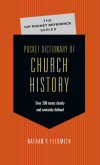
Studying church history is like learning your genealogy, with ample helpings of family recipes, scandalous disputes, inspiring heroes, quirky uncles, and scrapbooks of photos thrown in. Someone needs to point out what’s important and remind you of the facts as you learn to tell the story on your own.
The Pocket Dictionary of Church History is designed to help students identify the people, places, events, movements, and ideas that checker the story of the church through the ages.Here is an indispensable glossary, the perfect companion to your study and reading of church history.
A Bible study resource that I can recommend for many reasons. The dictionary is small and easy to fit on a book shelf. It is of course economical. Church history is an interesting and important subject for any Christian who wants to understand the church: where it has been, and where it is going. Thanks Dr. Feldmeth, for giving the people in the pews an easy-to-use resource for getting a handle on that!
—Joan Tyvoll, 1340mag Books (1340magbooks.com), April 2009
Nathan P. Feldmeth is associate dean for extended education and assistant professor of church history at Fuller Theological Seminary in Pasadena, California. He has contributed articles to InterVarsity Press’s New Dictionary of Theology, Dictionary of Christianity in America and Dictionary of Major Biblical Interpreters.
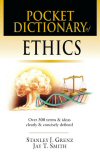
Ethics is as old as the city-state and as new as cyberspace. Guided by the wagon tracks of moral tradition, it nevertheless rides the cutting edge of science and technology. Increasingly, it is moving into the corner offices of law, business, medicine, science, and technology.
But few of us arrive in our first ethics class—or take our seat on an ethics committee—with a grip on the range of ideas and thinkers, perspectives, and pitfalls that make up this ancient conversation about what is good and right and moral. We may feel like college math students who slipped through high school without learning algebra. Not only does this brief and convenient reference book take you where your desktop dictionary was not designed to go, it doubles as your basic A-to-Z survey or refresher course in ethics.
Stanley J. Grenz (1950–2005) was Pioneer McDonald Professor of Theology at Carey Theological College, Vancouver, British Columbia, and professor of theological studies at Mars Hill Graduate School, Seattle, Washington. He authored over 25 books, includingRediscovering the Triune God and What Christians Really Believe and Why.
Jay T. Smith (PhD, Trinity College-University of Bristol, DMin, Carey Theological College) is senior pastor of First Baptist Church in Bozeman, Montana and principal of the Montana Centre for Faith, Adventure, and the Arts.
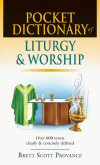
Today there is a rising tide of interest in worship and a renewed study of the church’s heritage of liturgy. But as students quickly learn, there are numerous terms, texts, and traditions for which regular dictionaries and even theological dictionaries are no help. The Pocket Dictionary of Liturgy and Worship is a quick-reference guide for students engaged in readings and lectures as well as for leaders of worship and liturgy who want to renew, check, or expand their knowledge.The range of topics includes: altar call and benediction, baptism and Eucharist, kneeling and sign of the cross, and All Saints’ Day and Easter.
Provance has done us all a favor by listing more than 600 of the more commonly used terms associated with liturgy and worship, including many that are infrequently used. A four-page bibliography tops it off, enough to get you started into a more serious study. Best of all, this book really does fit in your pocket, right next to your cell phone and change!
—Larry Sibley, Reformed Worship, Issue 96, 2010
Brett Scott Provance (PhD, Claremont Graduate University) is a writer and Associate Professor of Humanities at California Baptist University.
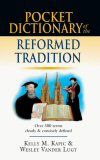
Beginning to study Reformed theology is like stepping into a family conversation that has been going on for 500 years. How do you find your bearings and figure out how to take part in this conversation without embarrassing yourself?
The Pocket Dictionary of the Reformed Tradition takes on this rich, boisterous, and varied tradition in its broad contours, filling you in on its common affirmations as well as its family tensions. Here you will find succinct and reliable entries on latin terms, confessions, and doctrines, as well as theologians such as John Calvin and apologists such as Francis Schaeffer.
The ‘pocket’ dictionaries are quite handy. Pick them up and keep them near your desk. I use them regularly in preparing myself to talk with others about religious matters and they don’t take up much shelf space.
—Chris Reeves, Truth Magazine, May 2014
Kelly M. Kapic is professor of theological studies at Covenant College in Lookout Mountain, Georgia. He earned a PhD in systematic and historical theology at King’s College, University of London and an MDiv at Reformed Theological Seminary in Orlando, Florida.
Kapic is the author or editor of numerous books such as A Little Book for New Theologians, God So Loved He Gave, Communion with God, and Mapping Modern Theology. Additionally, he has published articles in various journals, such as the International Journal of Systematic Theology, Westminster Theological Journal, Conversations in Religion and Theology, and Evangelical Quarterly.
Wesley Vander Lugt (PhD, St. Andrews University) is lead pastor of Warehouse 242 in Charlotte, North Carolina. He earned an MDiv from Covenant Theological Seminary, a BA in history from Covenant College, and has been actively involved in Christian ministry for eight years in Scotland, Mexico and the United States.
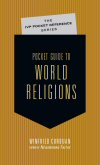
Here is a concise, informative guide for anyone looking for answers to basic questions about the world’s varied religions. In short, incisive chapters, Winfried Corduan introduces readers to 12 of the world’s major religions, including Baha’i, Buddhism, Christianity, Confucianism, Daoism, Hinduism, Islam, Jainism, Judaism, Parsi, Shinto, and Sikhism. For each, he offers brief descriptions of its name, numbers, and distribution, key symbols, history, Scriptures, major beliefs, subgroups, worship practices, home practices, clothing, diet, and calendar. Also included are even briefer descriptions of 16 new religious movements and traditional or tribal religions. This book is for students, pastors, and other busy people who want the quick, bare-facts scoop on current religions.
This is a book all Christians can readily use. . . . Short and compact, this guide provides an excellent starting point for those wanting to know more about the new world of religions around them. It would be an excellent tool for churches wishing to educate and train their congregations to engage them in their own neighborhoods with some understanding.
—David Ripley, Billy Graham Center, Wheaton, IL, EMQ April 2007
Winfried Corduan (PhD, Rice University) is professor emeritus of philosophy and religion at Taylor University, Upland, Indiana. He has led many undergraduate tours focusing on the lived religious traditions of various parts of the world. He is the author of several books, including Handmaid to Theology, Reasonable Faith: Basic Christian Apologetics, Neighboring Faiths, and A Tapestry of Faiths.
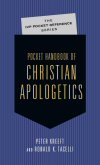
“Be ready to give a reason for the hope that is in you,” wrote the apostle Peter. That is what apologetics is all about. Here is a concise, informative guide for anyone looking for answers to questions of faith and reason. Peter Kreeft and Ronald K. Tacelli have condensed their popular Handbook of Christian Apologetics, summarizing the foremost arguments for major Christian teachings and offering compelling responses to the most common arguments put forward against Christianity. In this book, you’ll find answers to questions about faith and reason, the existence of God, creation and evolution, the reliability of the Bible, and life after death, among others. The Pocket Handbook of Christian Apologetics is the place to begin for people with questions about Christianity.
Peter Kreeft (PhD, Fordham University) is professor of philosophy at Boston College where he has taught since 1965. A popular lecturer, he has also taught at many other colleges, seminaries, and educational institutions in the eastern United States. Kreeft has written more than fifty books, including The Best Things in Life, The Journey, How to Win the Culture War and, with Ronald Tacelli, Handbook of Christian Apologetics.
Ronald K. Tacelli SJ, is associate professor of philosphy at Boston College and has published articles in the Public Affairs Quarterly and Downside Review.
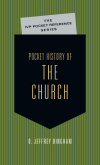
The story of Christianity is a fascinating tale. Here we find drama, vision, and expansion along with failure, setbacks, and tragedy. Yet during the past 2000 years, the power of Jesus is felt throughout the interplay of human actors and the forces of world events.
How can you grasp the story played out on such a gigantic stage? This book is an ideal place to start. D. Jeffrey Bingham has skillfully selected the key people and episodes to tell a grand and humbling story. From Roman persecution to the early creeds, from the monastic movement to the Reformation, from the rise of liberalism to missionary expansion, he chronicles the ups and downs of a people and a faith.
This pocket history has been crafted for students, pastors, and other busy people who want an informed, clear, and concise presentation that feeds the mind and moves the heart. It is an account that nurtures the Christian virtues of faith, hope, and love. For Bingham aims not only to uncover the treasures of the church’s past but also to show how history aids your own spiritual journey today.
Jeffrey Bingham has written a carefully etched series of postcards from a big country called The Past. Those who attend to these messages will be illuminated, instructed, and edified. Many will soon realize that there is much, much more to learn about the bearing of Christian history on the present. But all should be thankful for the engaging introduction provided by this book.
—Mark A. Noll, McManis Professor of Christian Thought, Wheaton College
D. Jeffrey Bingham (PhD, Dallas Theological Seminary) is associate dean, biblical and theological studies, and professor of theology at Wheaton College. He is general editor for The Bible in Ancient Christianity Monograph Series from E. J. Brill (Leiden).
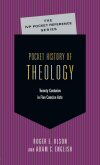
Here is a concise and informative guide to the history of Christian theology. This condensation of Roger Olson’s widely acclaimed The Story of Christian Theology surveys the events, teachings, and challenges to the Christian faith down through the ages. In five acts, we are ushered from the second to the twenty-first century, following all the twists and turns, wrinkles, and rivalries that lay along that wonderful and humble way of Christian faith, seeking understanding, articulation, and explanation.
Crafted for students, pastors, and other busy people, this pocket history of theology provides a clear and informed guide to the central tenets of Christian faith and the internal threats and external challenges it has faced and continues to confront even today.
This may be the most important book in the series for Christians to read and study. . . . [The authors] have written in such a practical manner, highlighting the major developments down through church history, that there is no excuse for Christians not taking the time to read and understand what they profess to believe when they confess their faith using creeds and confessions of our history.
—Equip for Ministry, March/April 2006
Roger E. Olson (PhD, Rice University) is professor of theology at George W. Truett Theological Seminary of Baylor University in Waco, Texas. He is the author of The Story of Christian Theology: Twenty Centuries of Tradition & Reform, The Mosaic of Christian Belief: Twenty Centuries of Unity & Diversity and The Westminster Handbook to Evangelical Theology.
Adam C. English (PhD, Baylor University) is an associate professor in the department of religion and philosophy at Campbell University in Buies Creek, North Carolina. He has published articles and book reviews in Christian Ethics Today, Perspectives in Religious Studies and the Journal of Church and State. English is an ordained minister in the Baptist tradition and the author of The Possibility of Christian Philosophy (Rutledge, 2007).
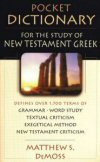
Pocket Dictionary for the Study of New Testament Greek
- Author: Matthew S. DeMoss
- Series: IVP Pocket Reference
- Publisher: IVP Academic
- Publication Date: 2001
- Pages: 138
If you are beginning your study of New Testament Greek or Greek exegesis, this book is for you! From ablative to zeugma, it defines the tangled terms that infest Greek textbooks, grammars, and lexicons.
Here is the book to deliver you from late-night ponderings of the predicate and frantic fumings over the fricative. It is the indispensable lexicon to that third language that is neither Greek nor recognizable English: the technical vocabulary of grammarians, lexicographers, linguists, and Greek instructors. This pocket dictionary gives you the inside edge on the terminology of exegesis, textual criticism, and biblical criticism.
For seminary students, pastors, and serious laypeople, this book serves as a wonderful softcover PalmPilot into the lingo of the Greek exegetical world.
—Darrell L. Bock, executive director of cultural engagement and senior research professor of New Testament studies, Dallas Theological Seminary
This bibelot is a veritable gem . . . a very useful key for students of the New Testament and its Greek and a great boon to teachers. I hope that all of my students will wear out at least one copy!
—David M. Scholer, former professor of New Testament, Fuller Theological Seminary
A necessity for students of the Greek New Testament.
—Robert H. Gundry, scholar-in-residence, Westmont College
Matthew S. DeMoss is a book review editor and production manager of Bibliotheca Sacra. He received a BA from Columbia International University and ThM from Dallas Theological Seminary.
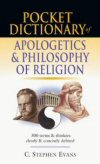
Pocket Dictionary of Apologetics and Philosophy of Religion
- Author: C. Stephen Evans
- Series: IVP Pocket Reference
- Publisher: IVP Academic
- Publication Date: 2002
- Pages: 125
For philosophers, the pursuit of truth travels on precise definitions. For Christian apologists, the defense of the faith is founded on the defining Word. And for beginning students of either discipline, the difference between success and frustration begins with understanding the terms and ideas and identifying the thinkers and movements.
The Pocket Dictionary of Apologetics and Philosophy of Religion is designed to be a companion to your study of these two related disciplines. Among its 300 entries are:
- Terms, from a posteriori to worldview
- Apologists, from Abelard to Van Til
- Philosophers of religion, from Alston to Wolterstorff
- Movements, from analytic philosophy to voluntarism
- Apologetic arguments, from the cosmological to the wager
- Theologies, from Arminianism to Zoroastrianism
Here is an affordable and easily accessible help key for your readings, lectures, writing assignments, and exam preparation. It’s a must-have study aid for any student who expects to cogitate on coherentism or ruminate on Ricouer.
C. Stephen Evans is a distinguished university professor of philosophy and the humanities at Baylor University. He previously taught in the philosophy departments at Calvin College, St. Olaf College, and Wheaton College. His publications include Why Believe?, The Historical Christ and the Jesus of Faith: The Incarnational Narrative as History, Kierkegaard’s Ethic of Love and Keirkegaard on Faith and the Self: Collected Essays.
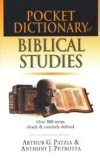
Pocket Dictionary of Biblical Studies
- Authors: Arthur G. Patzia and Anthony J. Petrotta
- Series: IVP Pocket Reference
- Publisher: IVP Academic
- Publication Date: 2002
- Pages: 128
If you are puzzled by parataxis or rankled by recensions, the Pocket Dictionary of Biblical Studies is the companion you need. Whether you are studying the Old Testament or New Testament, this little book is your private tutor, your ever-ready guide to over 300 biblical-studies terms. Here’s your glossary for reading course textbooks, your decoder for listening to lectures, your review sheet for cramming for finals, and your help key for writing research papers.
Among the terms defined you’ll discover:
- Types of biblical criticism, from genre criticism to tradition criticism
- Greek and Latin terms, from agrapha to vaticinium ex eventu
- German terms, from Frühkatholizismus to Wissenschaft
- Ancient texts, from Aleppo Codex to Zadokite Document
- Literary features, from acrostic to woe oracle
- Theories, from the Augustinian hypothesis to the Yahwist source
- Textual criticism terms, from codex to Western text
Written by Arthur G. Patzia and Anthony J. Petrotta, two biblical studies professors who know what you need to know, Pocket Dictionary of Biblical Studies will be your essential guide into a fascinating world of understanding.
Arthur G. Patzia (PhD, McMaster University) is a senior professor of New Testament at Fuller Seminary Northern California.
Anthony J. Petrotta (PhD, University of Sheffield) is an adjunct associate professor in Old Testament at Fuller Seminary Northern California.
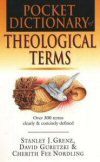
Pocket Dictionary of Theological Terms
- Authors: Stanley J. Grenz, David Guretzki, and Cherith Fee Nordling
- Series: IVP Pocket Reference
- Publisher: IVP Academic
- Publication Date: 1999
- Pages: 122
Beginning to study theology is like stepping into a conversation that has been going on for two thousand years. How do you take part in this conversation—or even make sense of it—if you don’t understand the vocabulary or know the contributions made by other participants?
The Pocket Dictionary of Theological Terms is the perfect companion to your theological studies. Among its 300-plus definitions are:
- English terms, from accomodation to wrath of God
- Foreign terms, from a posteriori to via media
- Theological movements and traditions, from the Alexandrian School to Wesleyanism
- Theologians, from Anselm of Canterbury to Ulrich Zwingli
This may be the most important book in the series for Christians to read and study. . . . [The authors] have written in such a practical manner, highlighting the major developments down through church history, that there is no excuse for Christians not taking the time to read and understand what they profess to believe when they confess their faith using creeds and confessions of our history.
—Equip for Ministry, March/April 2006
Stanley J. Grenz (1950–2005) earned a BA from the University of Colorado at Boulder in 1973, an MDiv from Denver Seminary in 1976, and a DTheol from the University of Munich, Germany in 1978. Ordained into the gospel ministry in 1976, Grenz worked within the local church context as a youth director and assistant pastor at Northwest Baptist Church in Denver, pastor at Rowandale Baptist Church in Winnipeg, and interim pastor.
David Guretzki (PhD, McGill U.) is a professor of theology and serves as the dean at Briercrest Seminary in Caronport in Saskatchewan, Canada.
Cherith Fee Nordling (PhD, University of St. Andrews) works with the Antioch Leadership Network in Grand Rapids, Michigan.